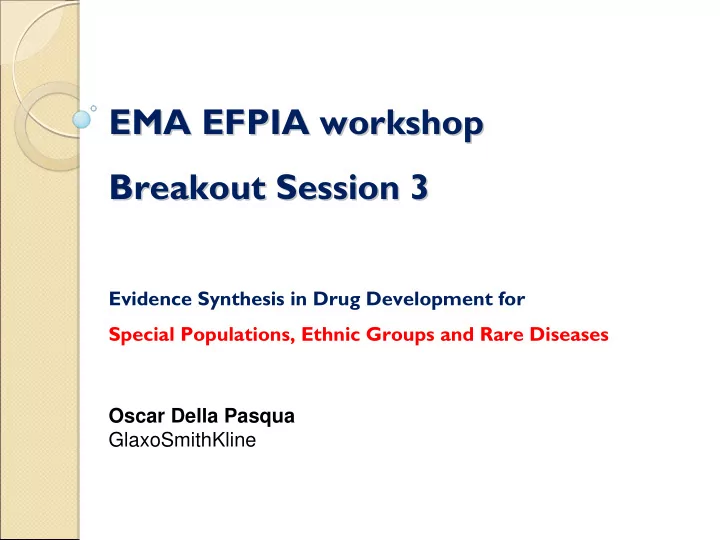

EMA EFPIA workshop EMA EFPIA workshop Breakout Session 3 Breakout Session 3 Evidence Synthesis in Drug Development for Special Populations, Ethnic Groups and Rare Diseases Oscar Della Pasqua GlaxoSmithKline
LEADING STATEMENTS LEADING STATEMENTS 1. An evidence-based approach is often unsuitable for the evaluation of pharmacokinetics, pharmacodynamics, safety and efficacy in special populations, ethnic groups and rare diseases. 2. Inferential methods (M&S) should underpin evidence synthesis and knowledge integration in the development of drugs for special populations, ethnic groups and rare diseases 3. Inferences are required to support evidence synthesis during the design stage (i.e., protocol optimisation) , as well as during the analysis and interpretation of existing or new evidence. 4. The consequences of M&S assumptions must be assessed . Assumptions can be violated (this should be addressed accordingly e.g. by additional evidence or by a better model), mitigated (e.g., by label restriction, dose titration) or pertain as risk to patients and other stakeholders (e.g., regulator/sponsor).
Evidence synthesis in the development of drugs for special populations, ethnic groups and rare diseases TO ADDRESS CLINICAL, SCIENTIFIC OR REGULATORY QUESTIONS BY INFERENTIAL METHODS ONE MUST CONSIDER THE FOLLOWING COMPONENTS:
Evidence synthesis in the development of drugs for special populations, ethnic groups and rare diseases Historical data from a different Data from population another disease Data from other compounds with similar PK / PD M&S
ASSUMPTIONS: which biological, pharmacological and clinical ASSUMPTIONS: aspects need to be considered when extrapolating across populations? Within groups or populations but different stratification factors: Across endpoints or diseases:
ASSUMPTIONS: which statistical aspects need to be considered ASSUMPTIONS: when extrapolating across populations ? VARIABILITY : Across age groups, ethnicities, endpoints and diseases HOMOGENEITY : Across age groups, ethnicities, endpoints and diseases EFFECT SIZE : Across age groups, ethnicities, endpoints and diseases UNCERTAINTY: due to sparseness of evidence, model misspecification, bias or lack of knowledge.
Impact of Assumptions Impact of Assumptions Evidence vs. Inference Evidence vs. Inference Development goal Severity/importance of consequence Mitigation measures Evidence synthesis Likelihood of violation
Impact of Assumptions Impact of Assumptions Evidence vs. Inference Evidence vs. Inference Severity/importance of consequence • ADDITIONAL EVIDENCE (e.g. prospective or historical) • ASSESSMENT OF PARAMETER & MODEL UNCERTAINTY (i.e., acceptance of risk) • IDENTIFY A BETTER MODEL Likelihood of violation
CHALLENGE: framework to handle M&S assumptions CHALLENGE: Model-based …. Model-based …. Clinical and statistical assumptions Clinical and statistical assumptions YES Can historical data Can historical data on the same population on the same population YES be used to be used to support evidence? support evidence? Can historical data Can historical data Model based… Model based… from another from another YES clinical, biological clinical, biological population be used NO population be used and statistical and statistical to extrapolate across to extrapolate across assumptions assumptions groups groups Can data from Can data from another disease another disease NO be used to support be used to support YES extrapolations? extrapolations? Model based… Model based… biological biological Can data on Can data on pharmacological pharmacological another outcome another outcome YES and statistical and statistical NO of therapy be used to of therapy be used to assumptions assumptions support extrapolations? support extrapolations? Can in vitro/in vivo data Can in vitro/in vivo data YES be used to be used to NO support extrapolations? support extrapolations? Can Can simulated theoretical simulated theoretical PKPD relationships be used to PKPD relationships be used to NO support extrapolations support extrapolations
CHALLENGE: framework to handle M&S assumptions CHALLENGE: Assumption Probability to Clinical Impact of M&S on development violate Consequences programme Definitely Minor Reduce trial burden PK properties Likely Major Reduce sampling frequency Unlikely Unknown Improbable PD properties Definitely Minor Incorporation of biomarkers Likely Major Better dose rationale Unlikely Unknown Improbable Disease Definitely Minor Population selection Likely Major Stratification Unlikely Unknown Different recommendation Improbable (e.g., contraindication) Patient Definitely Minor Estimation of covariate effects Likely Major Define appropriate inclusion criteria population Unlikely Unknown Improbable Statistical aspects Definitely Minor Reduce sample size Likely Major Higher statistical power Unlikely Unknown Eliminate need for a study Improbable
Case Studies Case Studies We we will illustrate how M&S can be used as a management tool for evidence synthesis and how assumptions can be managed during drug development for special populations, ethnic groups and rare diseases. In these examples, focus will be given to the following ASSUMPTIONS : 1.Use of historical data from a reference population under the assumption of scalable ADME processes 2.Use of data from another disease (indication) under the assumption of comparable pathophysiology and PKPD relationship across populations 3.Use of historical data from a reference population under the assumption of similar parameter-covariate relationships, no model misspecification 4.Use sparse data under the assumption of no model uncertainty and parameter precision
Recommend
More recommend